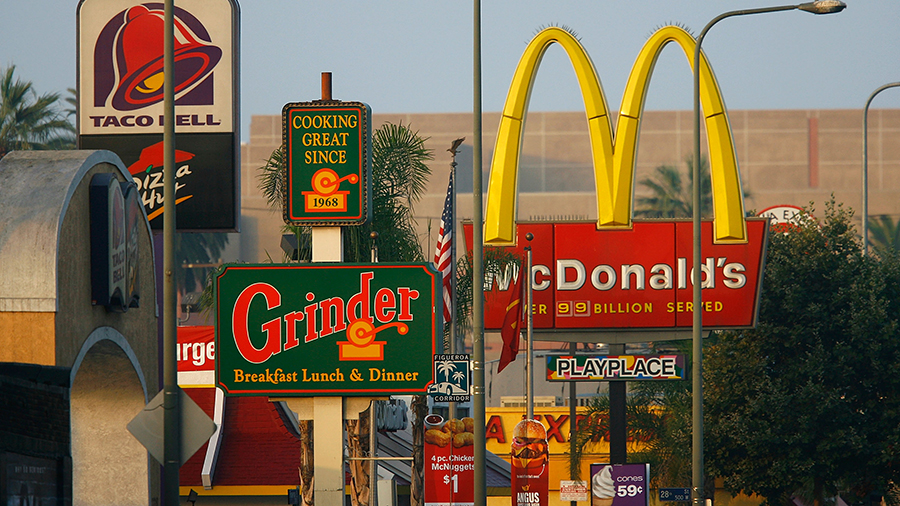UNCATEGORIZED
Food franchises are spending millions to oppose raises for their workers
Jan 25, 2023, 4:34 PM

Signs for Taco Bell, Grinder, McDonalds, Panda Express fast-food restaurant line the streets in the Figueroa Corridor area of South Los Angeles (David McNew/Getty Images)
(David McNew/Getty Images)
(CNN) — California voters will decide next year on a referendum that could overturn a landmark new state law setting worker conditions and minimum wages up to $22 an hour for fast-food employees in the nation’s largest state.
Chipotle, Starbucks, Chick-fil-A, McDonald’s, In-N-Out Burger and KFC-owner Yum! Brands each donated $1 million to Save Local Restaurants, a coalition opposing the law. Other top fast-food companies, business groups, franchise owners, and many small restaurants also have criticized the legislation and spent millions of dollars opposing it.
The measure, known as the FAST Act, was signed last year by California Gov. Gavin Newsom and was set to go into effect on January 1. On Tuesday, California’s secretary of state announced that a petition to stop the law’s implementation had gathered enough signatures to quality for a vote on the state’s 2024 general election ballot.
The closely-watched initiative could transform the fast-food industry in California and serve as a bellwether for similar policies in other parts of the country, proponents and critics of the measure argued.
The law is the first of its kind in the United States, and authorized the formation of a 10-member Fast Food Council comprised of labor, employer and government representatives to oversee standards for workers in the state’s fast-food industry.
The council had the authority to set sector-wide minimum standards for wages, health and safety protections, time-off policies, and worker retaliation remedies at fast-food restaurants with more than 100 locations nationally.
The council could raise the fast-food industry minimum wage as high as $22 an hour, versus a $15.50 minimum for the rest of the state. From there, that minimum would rise annually based on inflation.
California’s fast-food industry has more than 550,000 workers. Nearly 80% are people of color and around 65% are women, according to the Service Employees International Union, which has backed the law and the Fight for $15 movement.
Advocates of the law, including unions and labor groups, see this as a breakthrough model to improve pay and conditions for fast-food workers and overcome obstacles unionizing workers in the industry. They argue that success in California may lead other labor-friendly cities and states to adopt similar councils regulating fast-food and other service industries. Less than 4% of restaurant workers nationwide are unionized.
Labor law in the United States is structured around unions that organize and bargain at an individual store or plant. This makes it nearly impossible to organize workers at fast-food and retail chains with thousands of stores.
California’s law would bring the state closer to sectoral bargaining, a form of collective bargaining where labor and employers negotiate wages and standards across an entire industry.
Opponents of the law say it’s a radical measure that would have damaging effects. They argue it unfairly targets the fast-food industry and will increase prices and force businesses to lay off workers, citing an analysis by economists at UC Riverside which found that if restaurant worker compensation increases by 20%, restaurant prices would increase by approximately 7%. If restaurant worker compensation increased by 60%, limited-service restaurant prices would jump by up to 22%, the study also found.
“This law creates a food tax on consumers, kills jobs, and pushes restaurants out of local communities,” said the Save Local Restaurants coalition.
On Wednesday, McDonald’s US President Joe Erlinger blasted the law as one driven by struggling unions that would lead to “an unelected council of political insiders, not local business owners and their teams,” making key business decisions.
Opponents have turned to a similar strategy used by Uber, Lyft and gig companies that sought to overturn a 2020 California law that would have required them to reclassify drivers as employees, and not “independent contractors,” which would provide them with benefits such as a minimum wage, overtime, and paid sick leave.
In 2020, Uber, Lyft, DoorDash, Instacart and others spent more than $200 million to successfully persuade California voters to pass Proposition 22, a ballot measure that exempted the companies from reclassifying their workers as employees.
The-CNN-Wire™ & © 2023 Cable News Network, Inc., a Warner Bros. Discovery Company. All rights reserved.








